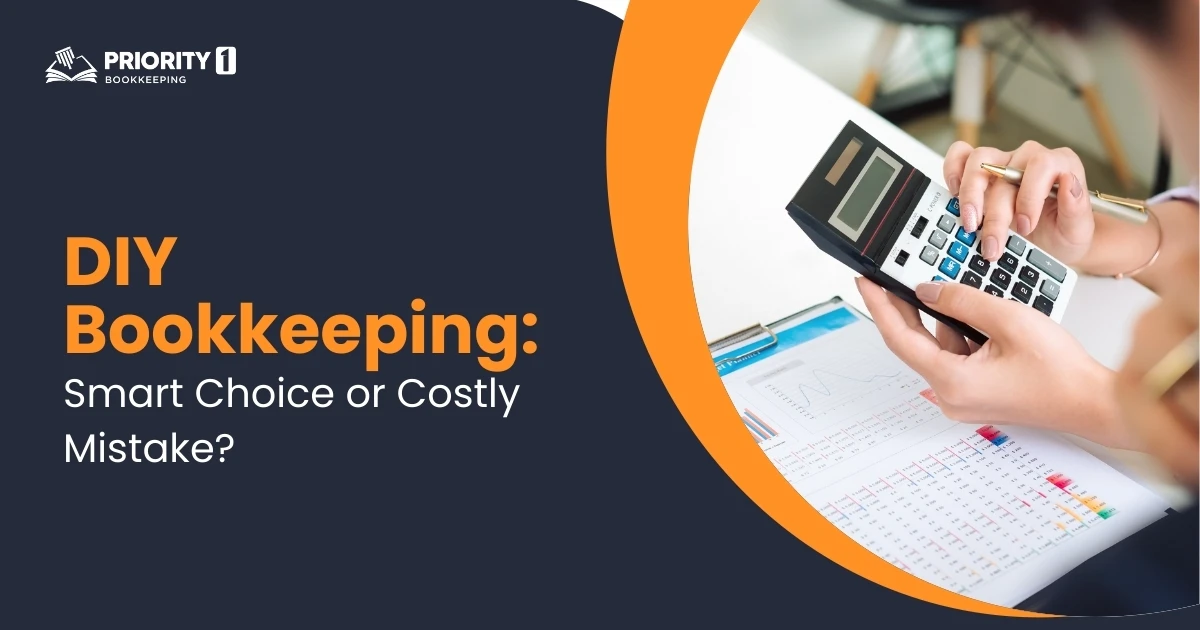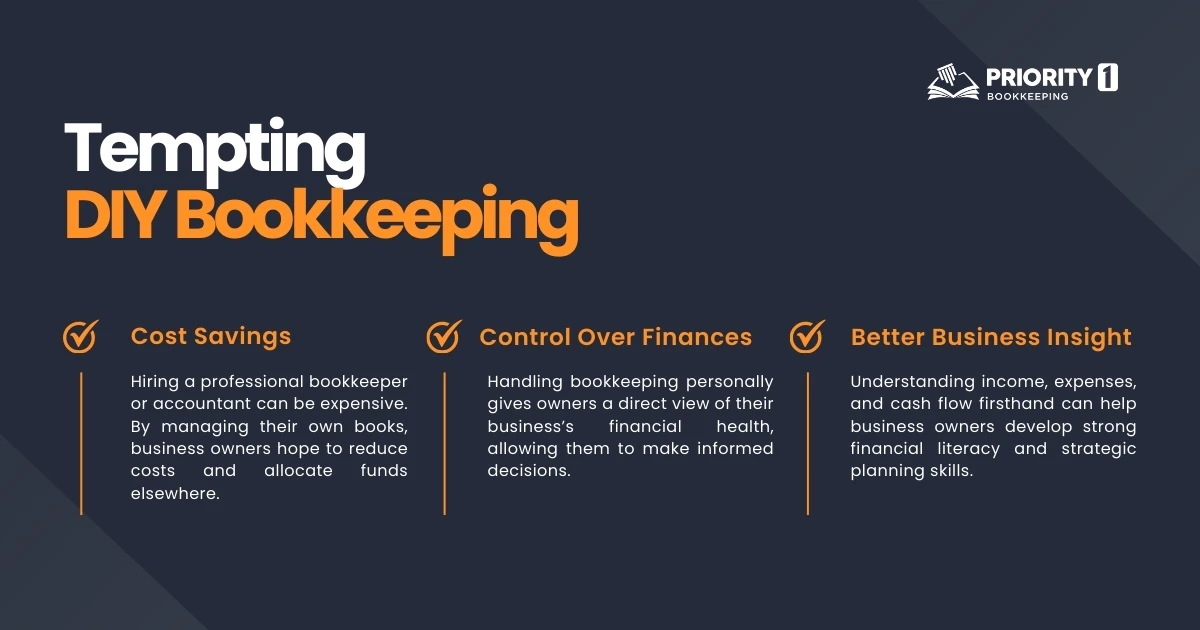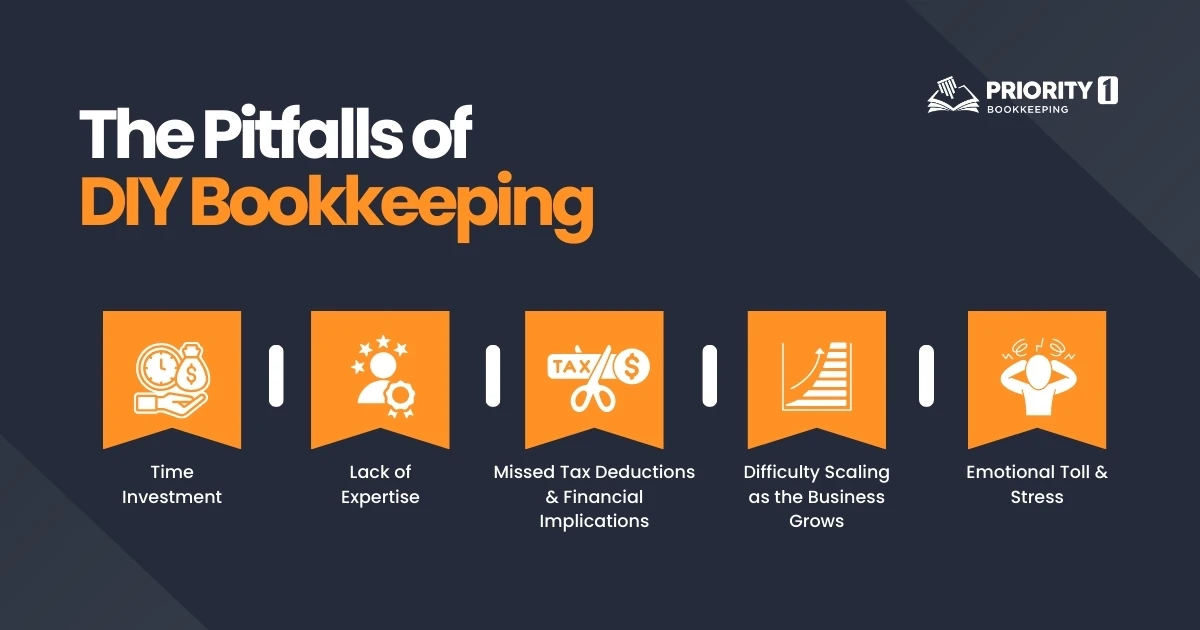
The DIY Bookkeeping Dilemma
Many small business owners start bookkeeping themselves to save money, believing it to be a straightforward task—tracking expenses, recording transactions, and filing taxes. However, as financial complexities grow, they often find themselves buried in spreadsheets, missing deadlines, and second-guessing their accuracy. What seemed like a cost-saving measure can quickly turn into a stressful and time-consuming challenge.
DIY bookkeeping is an attractive option for many small business owners, promising cost savings and full financial control. However, while it may seem like a smart way to cut expenses, it can quickly turn into a costly mistake if not managed properly.
This blog explores the pros and cons of DIY bookkeeping and helps you determine whether it’s the right choice for your business.
Why DIY Bookkeeping is Tempting

Many entrepreneurs consider DIY bookkeeping for several compelling reasons:
1. Cost Savings:
Hiring a professional bookkeeper or accountant can be expensive. By managing their own books, business owners hope to reduce costs and allocate funds elsewhere.
2. Control Over Finances:
Handling bookkeeping personally gives owners a direct view of their business’s financial health, allowing them to make informed decisions.
3. Better Business Insight:
Understanding income, expenses, and cash flow firsthand can help business owners develop strong financial literacy and strategic planning skills.
While these reasons are valid, it’s important to evaluate the potential risks before committing to DIY bookkeeping.
The Pitfalls of Going Solo: Where DIY Bookkeeping Can Go Wrong

Despite its appeal, DIY bookkeeping comes with hidden costs that many business owners overlook:
1. Time Investment
Bookkeeping requires consistent effort, from recording daily transactions to reconciling bank statements. A small business owner might spend anywhere from 5 to 20 hours per month managing finances—time that could be better spent on growing the business.
2. Lack of Expertise
Accounting principles, tax laws, and financial reporting can be complex. Without proper knowledge, DIY bookkeepers risk:
- Errors in financial statements that lead to incorrect decision-making.
- Misclassification of expenses, which can distort financial reports.
- Compliance issues, potentially resulting in penalties or fines from tax authorities.
3. Missed Tax Deductions & Financial Implications
A lack of expertise can lead to overlooked deductions, higher taxable income, and missed tax-saving opportunities. Professional bookkeepers understand tax regulations and can identify deductions that business owners may not be aware of.
4. Difficulty Scaling as the Business Grows
As businesses expand, financial transactions become more complex. Managing payroll, tax obligations, and cash flow forecasting can quickly overwhelm a business owner, making DIY bookkeeping unsustainable.
5. Emotional Toll & Stress
Many entrepreneurs experience stress, anxiety, and burnout from juggling bookkeeping with daily operations. One mistake in financial reporting can lead to sleepless nights and costly fixes.
Is DIY Bookkeeping Right for You?
DIY bookkeeping may be a feasible option if:
- Your business has simple transactions (e.g., a sole proprietorship with minimal expenses and revenue streams).
- You have a basic understanding of accounting or are willing to invest time in learning.
- You have a limited budget and prefer to allocate resources elsewhere.
However, honesty is key. If bookkeeping becomes overwhelming, outsourcing may be a smarter long-term investment.
Exploring Other Options: Alternatives to Full DIY Bookkeeping
If DIY bookkeeping isn’t a perfect fit, there are cost-effective alternatives that provide professional support without breaking the bank. Priority1 Bookkeeping offers flexible pricing models to suit different business needs:
1. Hiring a Part-Time Bookkeeper
A bookkeeper can handle essential financial tasks while allowing business owners to stay involved.
Estimated cost: $200–$500 per month, depending on workload and complexity.
2. Using Cloud-Based Accounting Software
Platforms like Xero, QuickBooks, and MYOB automate bookkeeping tasks, reduce manual errors, and provide financial insights.
Estimated cost: $20–$80 per month.
3. Consulting with an Accountant
Even if you handle daily bookkeeping, periodic consultations with an accountant ensure compliance and optimise tax strategies.
Estimated cost: $100–$300 per session.
Taking bookkeeping tasks separately—such as software subscriptions, occasional accountant consultations, and part-time bookkeeping—might seem cost-effective initially, but these costs add up and can create additional stress when juggling multiple services. Instead of piecing everything together, opting for a complete bookkeeping solution ensures seamless financial management, reduces stress, and is often more cost-effective when compared as a whole. Let the experts handle it all so you can focus on growing your business without the financial headaches.
Your Financial Future: Choosing the Best Path
Before deciding on DIY bookkeeping, consider the following checklist:
![]() Do I have time to manage bookkeeping accurately?
Do I have time to manage bookkeeping accurately?
![]() Do I understand accounting principles and tax regulations?
Do I understand accounting principles and tax regulations?
![]() Can I afford to correct potential mistakes?
Can I afford to correct potential mistakes?
![]() Will DIY bookkeeping distract me from growing my business?
Will DIY bookkeeping distract me from growing my business?
If you answered “no” to most of these questions, seeking professional bookkeeping assistance might be the best decision for your business.
Make an Informed Choice
DIY bookkeeping can work for some small businesses, but it carries significant risks. While cost-saving is a major incentive, the potential for errors, financial mismanagement, and stress can outweigh the benefits. By evaluating your situation carefully and exploring alternatives, you can ensure your business’s financial health remains strong.
Need guidance on bookkeeping? Contact Priority1 Bookkeeping today to get professional assistance tailored to your business needs.